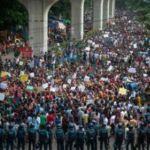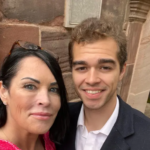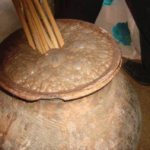Students, academic and non-academic communities in Morocco have condemned the action of the dean of Hassan II University’s faculty of science in Casablanca who refused to award an excellence prize to a high-achieving female student wearing a Palestinian keffiyeh.
The wearing of a keffiyeh has become a symbol of solidarity with the Palestinian cause at universities’ graduation ceremonies worldwide as students continue to challenge their governments’ and institutions’ ties with Israel amid its ongoing war in Gaza.
The National Union of Moroccan Students, or UNEM, posted a video taken at the 13 July awards ceremony which showed that, when the student was called to the stage, Mohammed Talbi, the dean of the faculty of sciences in Ben M’Sik, also part of Hassan II University, first tried to persuade Khadija Ahtour to remove the keffiyeh, which he allegedly deemed a ‘political statement’ and, therefore, inappropriate for a graduation ceremony.
Faced with the student’s refusal and boos of disapproval from the audience, the dean, a guest of honour at the event, left the stage shaking his head. Eventually, the school director intervened to present the student with her certificate.
The video of the incident went viral on social media, sparking outrage among university communities, including students, academics and employees who condemned the dean’s action and considered it a violation of the sanctity of the university, the suppression of freedom of expression guaranteed by the Moroccan Constitution and an attack on the female student’s privacy.
Criticism and support
Even the Moroccan Minister of Higher Education and Scientific Research, Abdellatif Miraoui, publicly criticised the dean over the incident.
Speaking at a session at the House of Representatives on 16 July, Miraoui described the dean’s behaviour as “unusual” and suggested it was a personal misstep rather than reflective of institutional policy.
“This appears to be a personal opinion of the professor, and he may have erred in his actions,” Miraoui stated.
However, some academics have been defending the dean. For example, Moroccan activist Younes Dafkir said: “The dean did his duty, as the ceremony was organised to hand over certificates and awards in the official and unified university uniform, which is the uniform that students wear.”
He added: “This uniform does not accept any modification in its appearance, even if it is by adding the Palestinian keffiyeh.” He also said: “The student struggle for Palestine must take place in the student arenas on campus, and not on official university platforms.”
Student communities respond
UNEM issued a statement on 15 July, saying that, given the killing and starvation of Palestinian people, university campuses were places where students could express their solidarity with the Palestinian cause in all available forms.
It was also a place where they could express their rejection of the normalisation of relations between the Moroccan and Israeli governments.
Against this backdrop, UNEM condemned the dean’s actions as “heinous”, saying it was not in line with the will of the Moroccan people, who have demonstrated their support for the Palestinian cause and are against the normalisation of relations that some Moroccan universities support.
“We call upon the dean of the faculty to apologise and to resign from his position,” UNEM said.
In another 14 July statement, UNEM also said that students from Mohammed VI Polytechnic University protested against the sudden cancellation of their graduation ceremony after they planned to wear the keffiyeh, too.
Similar incidents have been reported by students at Rabat’s faculty of letters and humanities.
Academic freedom
The Union for Higher Education and Scientific Research at Casablanca’s Higher School of Technology issued a statement on 13 July condemning the dean’s actions as “irresponsible” behaviour within an academic space and a violation of “academic freedom of expression”, asserting that it starkly contrasts with the prevailing sentiments of the Moroccan public.
The local office of the National Union of Employees of Higher Education and University Districts at the Higher School of Technology of Hassan II University in Casablanca also issued a statement on 14 July, saying: “We strongly condemn this reckless stance and irresponsible behaviour, and we stand in solidarity with the student who was subjected to this provocation, and we salute her for her courageous stance and patriotic sense towards the Palestinian issue.”
The National Federation of Education, or FNE, issued a statement condemning the dean’s action, saying this was “morally objectionable behaviour that is considered an extension of academic normalisation”.
Renewed opposition against normalisation
The video of the dean’s action has led to renewed opposition against academic normalisation in Moroccan universities.
The statements of the National Union of Moroccan Students, the Union for Higher Education and Scientific Research, the National Union of Employees of Higher Education and University Districts and the National Federation of Education called upon the university community to reject and confront all forms of normalisation and agreements signed by some of Morocco’s universities with the universities in Israel.
However, students and academics communities’ opposition to academic normalisation in Moroccan universities has been limited to petitions and sit-ins.
Following the normalisation of relations with Israel in December 2020, many Moroccan governmental sectors, including the Moroccan Ministry of Higher Education and Scientific Research, signed memorandums of understanding with Israeli partners.
Also, several Morocco-Israel universities’ cooperation agreements were signed, including an August 2021 agreement between the Mohammed VI Polytechnic University and Hebrew University of Jerusalem and Ben Gurion University of the Negev; the International University of Rabat and Ben Gurion University in November 2022, and three 2023 agreements between the Euro-Mediterranean University in Fez and the Hebrew University of Jerusalem, the Tel Aviv University and the Shenkar University.
When Morocco resumed diplomatic ties with Israel in December 2020, it joined several others in the region: the United Arab Emirates, Bahrain and Sudan, in addition to Egypt and Jordan, which had officially recognised Israel by signing peace agreements in 1979 and 1994 respectively.









